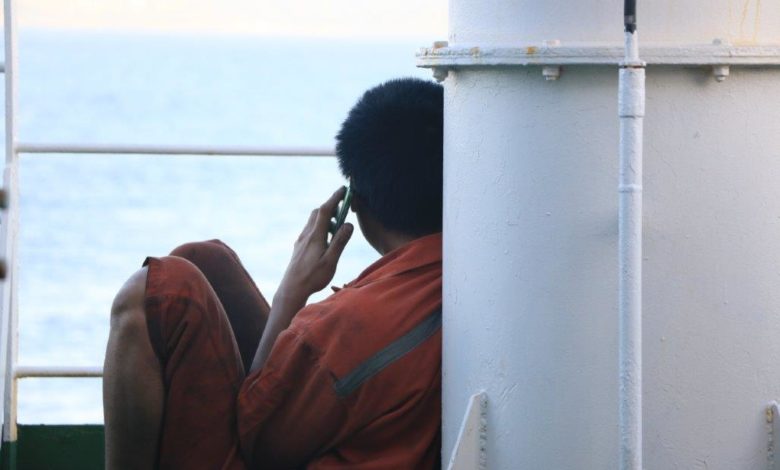Overhaul of MLC sought to reveal the real numbers of suicides at sea

The International Transport Workers’ Federation (ITF) is seeking changes to the Maritime Labour Convention (MLC) to better reflect the true numbers of suicides at sea.
Splash reported earlier this week the charity Seafarers UK was demanding a more reliable source of information about the scale of suicides at sea, a sad phenomenon reportedly increasing thanks to the protracted time crew are spending at sea because of travel restrictions put in place by the coronavirus. The picture is unclear as some suicides at sea may be being recorded erroneously as fatal accidents.
Splash lead columnist Andrew Craig-Bennett commented on the issue recently, noting that seafarers’ terms of employment are normally written so as to exclude the payment of a death in service benefit in the event of suicide. It is commonplace for suicide to be recorded as accidental death.
We have for years put forward the demand to include suicides under death benefit coverage since we strongly believe that suicide is a result of mental illness that can be enhanced by factors that occur as part of their work.
Jacqueline Smith, the ITF’s maritime coordinator, told Splash today: “Unfortunately, the major P&I Clubs have been unwilling to cover suicides. We have for years put forward the demand to include suicides under death benefit coverage since we strongly believe that suicide is a result of mental illness that can be enhanced by factors that occur as part of their work.”
However, the MLC states national laws or regulations may exclude the shipowner from liability in respect of “injury or sickness due to the wilful misconduct of the sick, injured or deceased seafarer”.
“While we’d like to see a change to the MLC in regards to the above highlighted paragraph, we know that this will take time given the stigma still associated with mental illness in many countries,” Smith said.
Splash is awaiting a response from the International Group of P&I Clubs on the issue brought up by the ITF.
Recent research by Yale commissioned by the ITF Seafarers’ Trust found a number of factors exacerbate poor mental health onboard for seafarers, including extensions to contracts.
The study of 1,572 seafarers found 20% of those surveyed had suicidal ideation, either several days (12.5%), more than half the days (5%) or nearly every day (2%) over the two weeks prior to taking the survey.
“While comparative data is limited, this analysis suggests that seafarers have higher rates of depression than other working populations, emphasising the need for appropriate mental health policies and management strategies in this isolated, vulnerable, and globally essential workforce,” the study, first published last October, stated.
In related news, the Maritime Charities Group (MCG), a coalition of 10 major maritime charities in the UK, has joined forces with the Merchant Navy Training Board to publish a good practice guide to designing a training course for seafarers on mental health and wellbeing awareness.
Written by experts from the maritime and education sectors in response to the growing mental health crisis amongst seafarers, the new Seafarers’ Mental Health Awareness and Wellbeing Training Standard was launched yesterday.
Author of the guide, Master Mariner and academic, Dr Chris Haughton, explained why the standard is needed: “Mental health awareness training is needed now more than ever and there are many reputable providers offering really good training courses. But the majority of those courses are generic and really don’t address the specific issues facing seafarers. If you’re working at sea you need a course that’s much more targeted otherwise it just won’t be relevant. That’s why we’ve developed the standard, setting out clearly what a good training course should cover.”
Commander Graham Hockley, chair of the MCG, said: “One in four people will develop a mental health problem during their lifetime, but the incidence amongst seafarers is much higher. The Covid-19 crisis has made the situation for seafarers even worse so now is exactly the right time to publish this guide.”

Congratulations Chris, Graham, MCG and MNTB for developing this standard which has been a long felt need that has been cleverly overlooked by many who could have done more to build such a tool much earlier.
Seafarers have been marginalized for far too long, and enough is enough. It is a shame that a global pandemic that impacted everyone had to take place to sharpen the focus on the front-line workers without who global trade could not be sustained.
I hope that such a standard becomes an international mandatory training standard in the not too distant future. AND in a language that seafarers can easily understand, adapt and benefit from every day, not only when they have a crisis, mental or otherwise.
Sorcerers at care of the mental health of the tribe.
Why they are thinking to develop another mandatory training for the seafarer? Don’t we have already enough training’s and courses? All these are done in our vacation time, a time which is supposed to be for relaxing. You are thinking of shortening the most useful tool we have in hand, vacation. Change the environment and conditions we are living in and not us. Stop these endless contracts of 9 month and more. Send the seamen more frequently to relax with their families. There are many of us seeing their home only 60 days in a full year. No wonder many of us are under mental stress. Where is the real MLC done for the seaman and not done by the companies. now in these days we see how helpless the international organizations are.